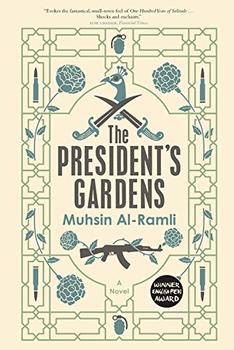Summary | Excerpt | Reviews | Beyond the Book | Readalikes | Genres & Themes | Author Bio

Critics' Opinion:
Readers' Opinion:
First Published:
May 2018, 352 pages
Paperback:
Apr 2019, 352 pages
 Book Reviewed by:
Book Reviewed by:
Poornima Apte
Buy This Book
CHAPTER 1
Sons of the Earth Crack
In a land without bananas, the village awoke to nine banana crates, each containing the severed head of one of its sons. Along with each head was an ID card to identify the victim since some of the faces were completely disfigured, either by torture before the beheading or by something similar after the slaughter. The characteristic features by which they had been known through all the years of their bygone lives were no longer present to distinguish them.
The first person to notice these crates alongside the main street was the dull-witted herdsman, Isma'il. Curious, he approached without dismounting from his donkey. The donkey's image was inextricably tied to Isma'il's in the minds of the people because of how long he had ridden it—sidesaddle, both legs hanging down on the same side—as though the two of them shared one body. As soon as Isma'il saw the bloody heads inside the boxes, he slid off his donkey and bent close, poking at them with the end of his staff. He recognized some of the heads. All traces of sleep fled his eyes as he rubbed them to make sure he wasn't dreaming. Then he looked around to confirm he was in his own village and not somewhere else.
The last silver light of dawn was filling the street. The shops on either side were closed. The sleeping village was calm and still, apart from the crowing of a rooster and the barking of a distant dog, responding to another dog in some yet more distant corner. In that moment, Isma'il felt liberated from the ancient sense of guilt that had pursued him in nightmares ever since, as a boy, he cut out the tongue of a goat that had annoyed him with its bleating when he was braiding a wool belt for Hamida amid the solitary silence of Hyena Valley.
In that same moment, Isma'il's tongue recovered from its paralysis, and he began screaming at the top of his lungs, causing his donkey to jump, his flock of sheep to freeze, and the pigeons and sparrows to launch from the treetops and rooftops. He kept yelling without realizing what he was saying, and his cries seemed to resemble the bleating of that goat whose tongue he had cut out and grilled. He kept yelling until he saw people rushing toward him from some of the village houses—then all the people from all the houses, after the alarm was raised over the mosque loudspeakers.
And if Abdullah Kafka had spoken about this incident, he would have said, "It was on the third day of the month of Ramadan, 2006. According to ancient history, that was when a strange amorphous blob with a giant body and a small head, called America, came from across the oceans and occupied a country named Iraq. Historians make clear in some footnotes that the people of that time had hearts that were primitive in their cruelty, savage hearts, like beasts of prey. As a result, among the injurious relations they had with each other were such dishonorable deeds as assault, terrorism, wars, invasions, and occupations. In those remote times, the heart of humanity was sunk in darkness. It wasn't a darkness of intellect or vision, such that man was unable to cogitate upon the murder of his brother man. Rather, it was much worse, in that he might actually follow through with it."
This is how Abdullah Kafka would see and speak about everything that happened, describing it all as ancient, lost, dead history. The present and the future didn't exist at all for him. There was only the past, and all of it was black. Some of it died irrevocably and didn't return, and the rest of it was repeated later, in a time that other people called the future.
Thus for all the years since his return from captivity in Iran, Abdullah Kafka, that prince of pessimists, had been content to sit on the same chair in the corner of the village café from the moment it opened its doors in the morning until it closed after midnight. Sipping cups of bitter coffee and glasses of tea black as ink, he would smoke a nargileh absentmindedly or just listen in silence. He returned greetings with a nod of his head or a gesture with a hand that still gripped the smoking nozzle of the water pipe. If he spoke, or rather, if he was forced to speak, he would go on speaking interminably, or he would be satisfied with a comment of no more than a few words.
Excerpted from The President's Gardens by Mushin Al-Ramli. Copyright © 2018 by Mushin Al-Ramli. Excerpted by permission of MacLehose Press. All rights reserved. No part of this excerpt may be reproduced or reprinted without permission in writing from the publisher.





The House on Biscayne Bay
by Chanel Cleeton
As death stalks a gothic mansion in Miami, the lives of two women intertwine as the past and present collide.

The Flower Sisters
by Michelle Collins Anderson
From the new Fannie Flagg of the Ozarks, a richly-woven story of family, forgiveness, and reinvention.

The Funeral Cryer by Wenyan Lu
Debut novelist Wenyan Lu brings us this witty yet profound story about one woman's midlife reawakening in contemporary rural China.
Your guide toexceptional books
BookBrowse seeks out and recommends the best in contemporary fiction and nonfiction—books that not only engage and entertain but also deepen our understanding of ourselves and the world around us.